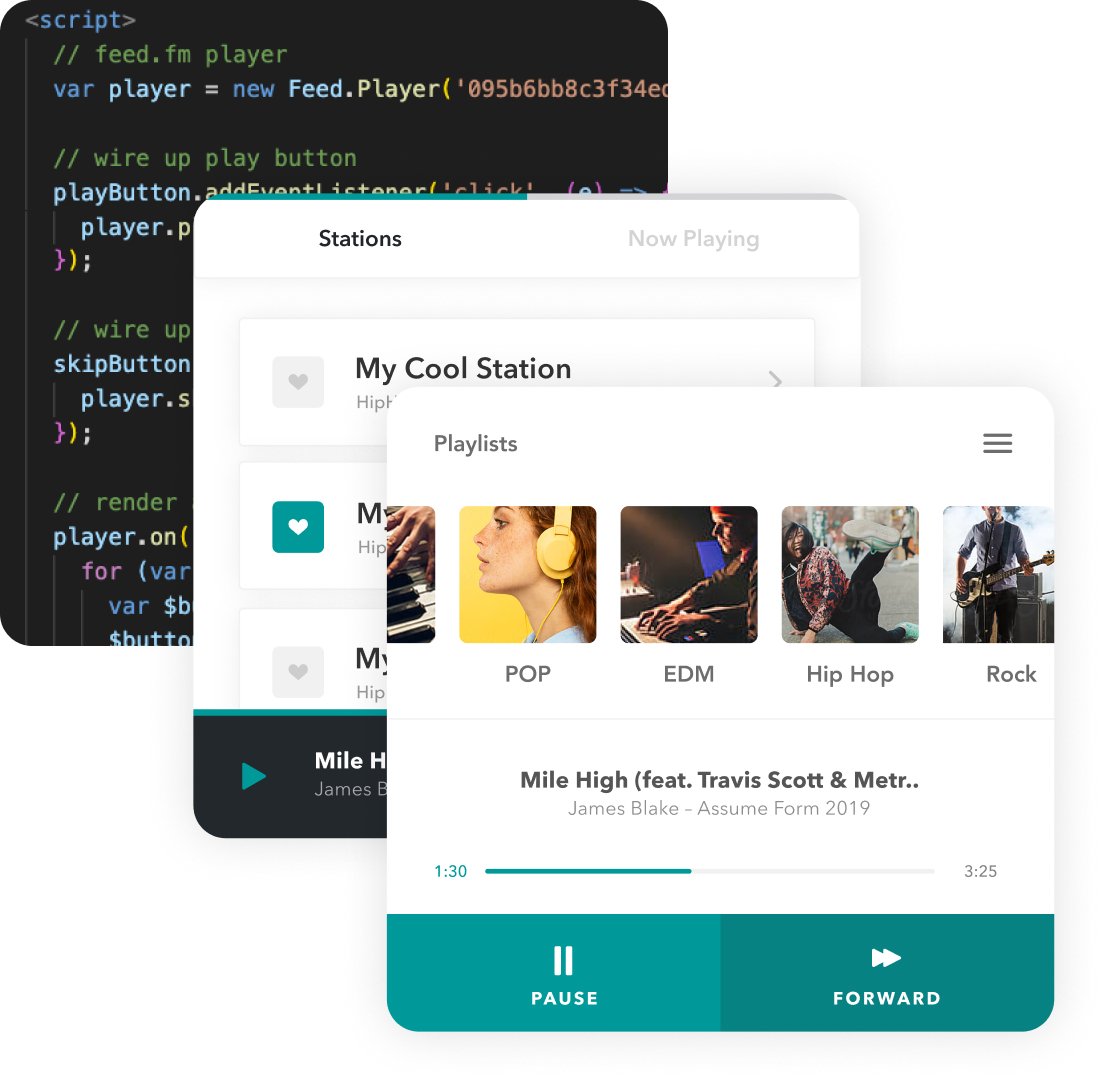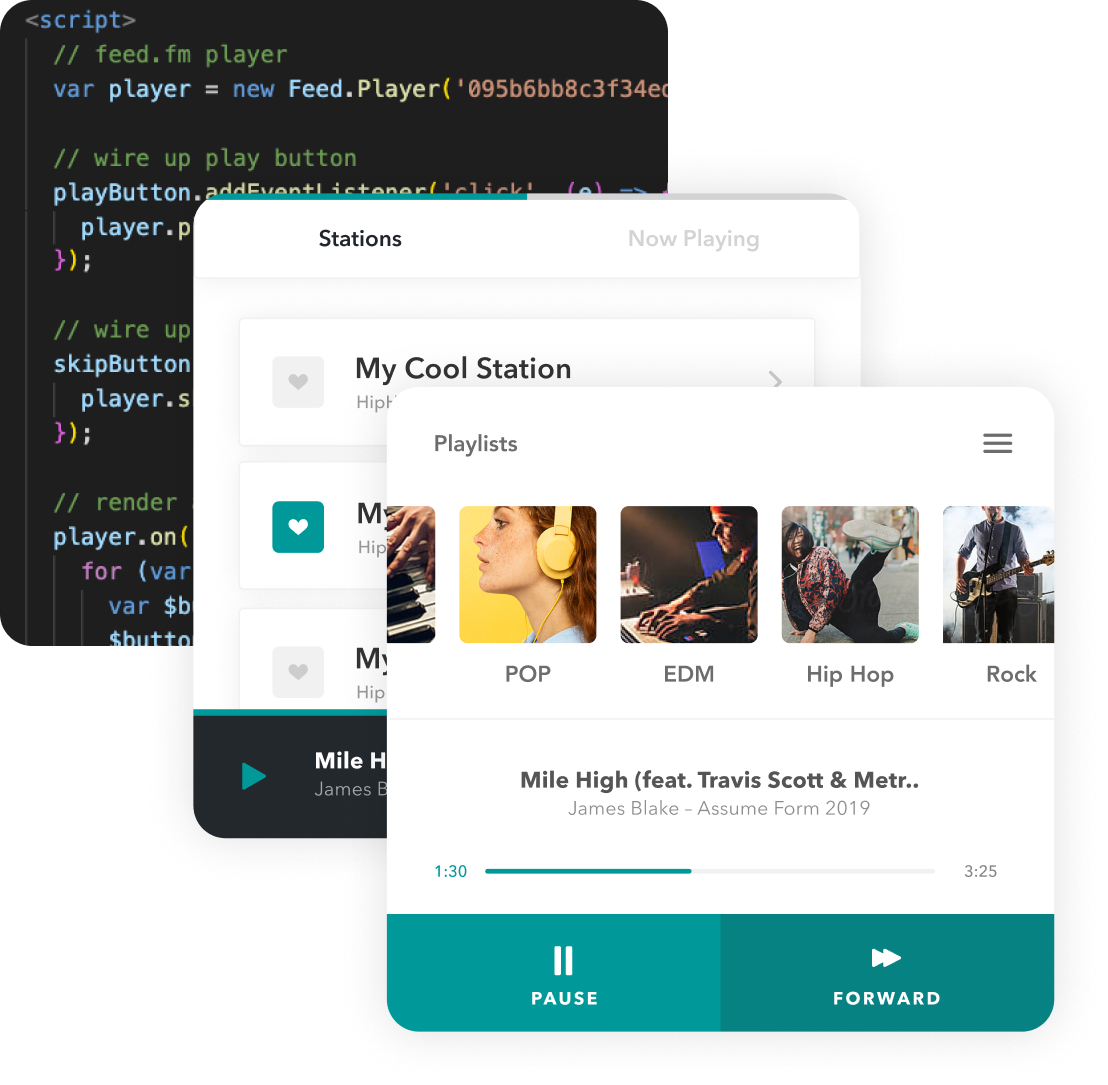APIs: Streamlining music integration for apps

At Feed Media Group (FMG), we have an amazing team of curators (recently highlighted here) that bring our brand partner’s soundtracks to life. But before that team can start working their magic, the music must first be acquired, packaged and cleared in a painstaking process handled by our equally talented and hard-working engineering team. This team is also responsible for wrangling the large volume of data sent by the music rightsholders on a regular basis. To be able to do this, they rely heavily on our proprietary music APIs.

Feed Media Group Engineering Team: Matt Sandler, Eric Lambrecht, Hugh Guiney, Chris Drew, Mark Slade.
In short, APIs, or application programming interfaces, are how apps talk to servers to obtain information. For FMG and anyone looking to stream music in their app, our proprietary music APIs manage music and the metadata associated with it. They retrieve information about albums, artists, song tracks, lyrics, and much more. These APIs are critical to ensure streaming music is played at the right time, to the right person, while giving artists proper credit, and tracking payments for artists and other rightsholders.
“In some ways, APIs seem deceptively simple,” says Feed Media Group CTO and Co-founder Eric Lambrecht, who built the first version of the B2B music platform six years ago and now leads the engineering team in developing tools, scripts, tech and automation. “But on the back end, we have to get the individual files from many different publishers and labels, and each one supplies the files and metadata in slightly different formats.”

Eric Lambrecht, CTO & Co-Founder, Feed Media Group
Many people don’t know that every song has two sets of rights to clear - the sound recording and the underlying composition. Upon matching the sound recording to the appropriate publishing rights and clearing a song for usage, the team then pulls in subjective metadata to add more richness to the track information and make music recommendations more effective. Subjective metadata helps describe how an individual track sounds - mood, instrumentation, and vocal descriptions all enhance algorithmic recommendations and aid the curation team in selecting the perfect track.
“Companies send us music in different ways, and we’ve got to translate it all and keep it simple,” Lambrecht says. “Music arrives on our platform 24/7. Our major label partners, for example, send new data, packages, and messages consistently throughout the day.” With music partners including Warner Music Group, BMG, and Merlin, our APIs are transforming how brands can interact with rightsholders and simplifying music distribution for all parties.
One of the biggest benefits of our set of APIs is that they help ensure rightsholders get paid for each use of their music. The engineering team is responsible for keeping track of every time a song is streamed and generating monthly reports for labels, publishers, and performing rights organizations, all of which have their own method of calculating how much they are owed.
“APIs empower us to automate data-driven tasks, to provide a whole class of services that solve a major stack of headaches related to music including, ingesting, streaming, and compensating rightsholders,” Lambrecht says. “We do the work to simplify it for everyone else.”
“APIs empower us to automate data-driven tasks, to provide a whole class of services that solve a major stack of headaches related to music including, ingesting, streaming, and compensating rightsholders. We do the work to simplify it for everyone else.” - Eric Lambrecht, CTO & Co-Founder, Feed Media Group
As for customers, our APIs free them from the legal issues and technical challenges of integrating streaming music into their digital experiences.
“Tonal has worked with Feed.fm for a number of years because we’ve been very happy with what they bring to the table. A big piece was the indemnification they offer — there’s nothing better than being able to bring in real music, and know that it’s someone else’s business to make sure we are protected,” Ryan Vance, Chief Content Officer, Tonal.
While businesses can use APIs from Spotify or Apple, those services are ultimately built to drive subscriptions and additional streams for the consumer platforms. “The biggest difference is less legal restriction on what you can do with the music,” Lambrecht says. “Our platforms allow businesses to stream music without any legal issues. Other services are trying to get users to subscribe or login to a separate app, there are a lot of restrictions with those. For example, only being able to stream 30 second previews unless a user signs up for a premium account. Our APIs are set up to integrate seamlessly into native apps, websites, and other digital products with robust SDKs. We also offer a pre-built player with flexible playback, analytics, and licensing compliance.”
These days, consumers expect to be able to consume digital content across all their devices - mobile phones, smart TVs, and desktop browsers. The team is dedicated to making their products compatible, and a lot of recent work has been done to support OTT platforms like Roku and Chromecast.
“We’re constantly looking for new ways to package our services for developers that allow them to make the most use out of it,” Lambrecht says. “Every device has its own set of challenges, and we are always working to optimize for compatibility.”

Music APIs retrieve information about albums, artists, song tracks, lyrics, and more.
“We’ve spent a lot of time scaling up to accommodate larger groups of people pulling music constantly,” he says. “We grew from a couple thousand plays a day to millions of plays a day, and we’ve been handling the increase in traffic well. Some of the most complex work happens on the Adaptr platform where we package our service to integrate with developers’ library toolkits for lightning-fast self-service integration.”
FMG’s music streaming APIs are not just helping our partners and customers, they are benefitting the entire music industry. For more reading on the API approach, and how tech companies can build their products on top of a pre-cleared catalog of songs and features, check out this blog explaining its potential by our CEO Jeff Yasuda.
APIs: Streamlining music integration for apps


 3 min
3 min